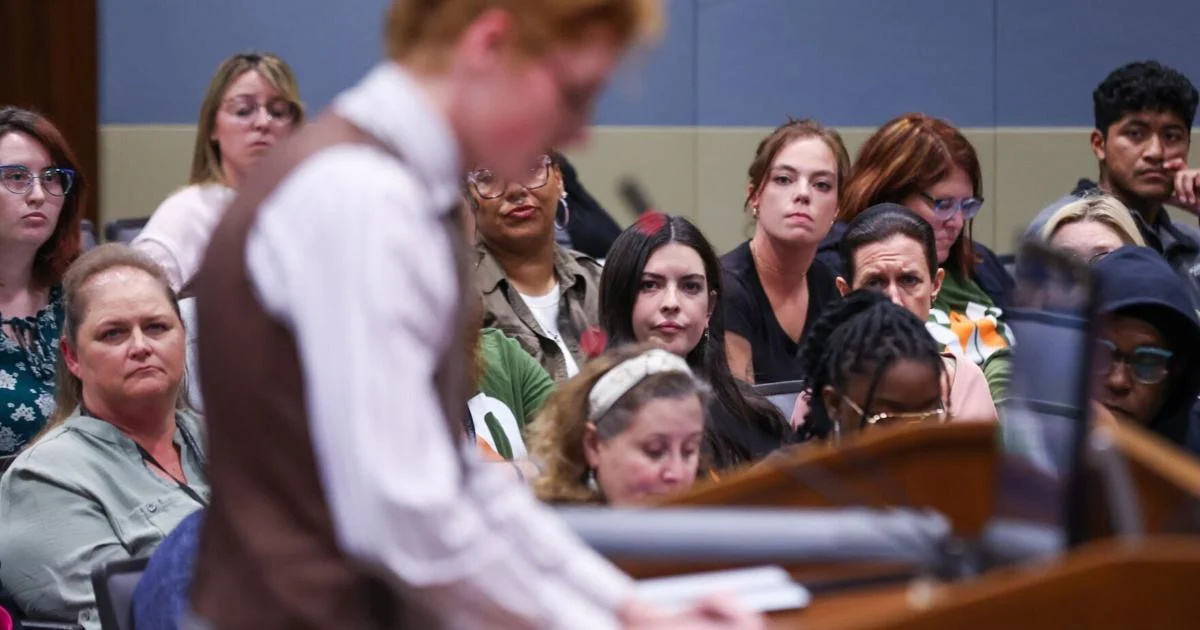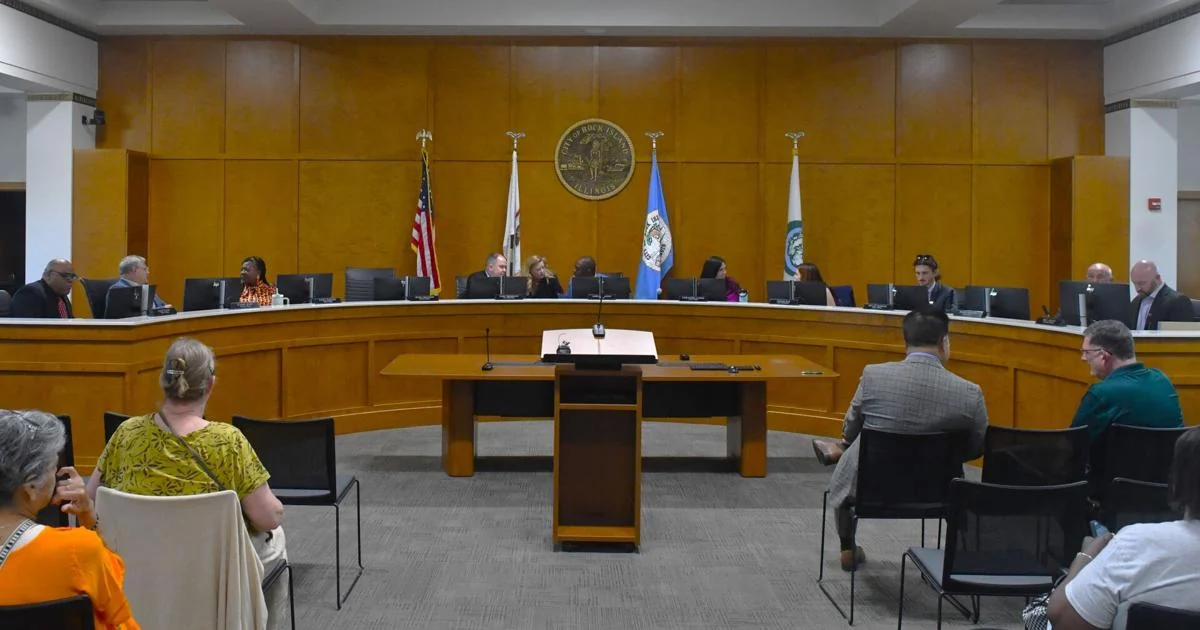
Gerald Johnson said it’s time for Omaha to do something about the city’s “out of control” homeless encampments.
“This is very frustrating when I see people on the street or on a traffic median,” he said in support of a proposed city ordinance that would make it a crime to camp on public property. “It’s a step in the right direction.”
But Rose Krekelberg, who found herself homeless after a childhood in foster care and subsequent addiction to alcohol and meth, urged rejection of the ordinance. She said those living on the street need compassion and help, not a jail cell.
“Please look closely at my face and remember it, so when you see someone begging, a person sleeping under a bridge, you think of me,” said Krekelberg, who now works as a homeless outreach worker in Omaha. “Because I am them, and they are me.”
So went the often emotional and impassioned testimony before the Omaha City Council Tuesday on the ordinance pushed by Omaha City Council member Brinker Harding to make camping on public property in Omaha a misdemeanor crime, carrying a penalty of up to a $300 fine and 30 days in jail.
After more than three hours of testimony, it seemed unlikely the ordinance would have the votes to pass. But it was also clear that the way that Omaha deals with encampments is bound for change.
Omaha Mayor John Ewing a day earlier pushed his own alternative plan that couples faster removal of homeless encampments with intensive outreach to help those living on the street get help.
Under the proposal worked out between the mayor and Threshold Coc, a nonprofit that receives federal funds to coordinate the local response to homelessness, those living in encampments would be given seven to 10 days to vacate.
During that time, workers from the city’s more than a dozen homeless outreach organizations, in partnership with the city, would work to try to get them social services, job support and shelter.
“We understand that we’ve got to do things differently,” said Jason Feldhaus, executive director of Threshold. “We do understand that citizens who are dealing with this in their backyards have real concerns.”
The metro area in the past decade has seen a sharp increase in “unsheltered” homeless — those living in cars, on the streets or in camps. It’s led to an increase in public complaints about encampments.
A representative of the Douglas County Sheriff’s Office read a statement from Sheriff Aaron Hanson backing Harding’s measure. He called encampments “hotbeds for crime” that are dangerous both for the vulnerable people who live in them as well as the people who live and work near them.
“They’re absolutely not a place where people get better,” Hanson said. “They expose people to violence, theft, exploitation and dangerous health conditions. They also create fear and uncertainty for families who live, work and play in the neighborhoods around them.”
Hanson drew a distinction between homelessness and encampments, acknowledging that law enforcement cannot solve homelessness.
But the sheriff’s testimony was followed by dozens of people opposed to the measure, among them private citizens, representatives of agencies who work to help the homeless and several people who were once homeless themselves.
They said the criminal penalty does nothing to address the underlying issues that most often lead people to life on the street, including addiction, mental illness, disabilities and the community’s lack of affordable housing.
“We are going to crack down on people who don’t have $300 to give, and don’t have anywhere to go when they get out of jail,” said Eli Hernandez of Omaha. “There’s no solution being presented here.”
Those who work in homeless outreach said the penalty would actually make it harder to help the homeless, creating mistrust, adding to their financial burdens, and creating criminal records that would make it difficult to obtain housing.
Chris Knauf, CEO of the Stephen Center in Omaha, told the story of a man who had been homeless for 10 years who finally decided to trust in the help offered by outreach workers, and now lives in an apartment. Had the ordinance been in place, Knauf said, that would not have been possible.
“He would have been in jail, saddled with fines, cut off from work and pushed further away from housing,” he said. “Criminalizing homelessness is neither humane nor effective.”
He also noted Stephen Center this year alone has turned away more than 3,100 men, women and children from its shelter because there were no available beds. Rather than spend $170 a day for a jail bed, he said, the city should spend the money on additional shelter beds.
Courtney Caron, who works in homeless outreach for the VA, said she currently has 40 veterans on her caseload, 24 of them living on the street or in cars.
She said 14 of them are women who were turned away from shelters because there was no room, and five of them are elderly people similarly turned away because of their high medical needs.
She urged anyone who is concerned about a homeless encampment not to call 911 but to call one of the outreach organizations.
“If you call street outreach, something might change,” she said.
Erin Feichtinger, policy director for the Women’s Fund of Omaha, noted that 60% of the people in Omaha who face eviction are women. And she said the issue is only going to get worse with recent cuts to federal safety net programs.
“This is not a serious solution in front of us today,” she said.
Nicole Engels, who formerly worked for the city administering homeless services grants, noted that the city spends little to deal with homelessness, its programs mostly funded by federal grants.
“If we want to make this a city issue, the city needs to step up and put our money where our mouth is,” she said.
George McGinness of Omaha said he was formerly a homeless addict who lived under bridges and in tents. He called the criminal penalty “a disgusting and dehumanizing idea.”
“They are human beings who are often fighting a battle many of you cannot even imagine,” he said. “This bill will not make our community safer or cleaner and will only push people further into the shadows.”
That would only make it harder to get them the help that they need, he said.
Angel Sharp of Omaha, who was also formerly homeless, said a $300 fine would not have gotten her off the street, but made her less likely to seek assistance.
“I’ve laid down at night, not knowing if I’d be woken up by the cold, by hunger, or by someone, including police, telling me to move along,” she said. “It was feeling like I was being treated as a criminal, not a human being in need of help.”
Pete Miller, the street outreach manager for Threshold, noted that the 15 local agencies performing outreach work last year helped move 443 street homeless directly into permanent housing.
“There’s more to do,” he said of outreach, “but it works.”
Whether Harding’s measure will come up for a vote next Tuesday, as currently scheduled, is unclear.
At least three of the seven council members expressed opposition to it. A fourth, Aimee Melton, backed the mayor’s approach, but also suggested the vote on Harding’s ordinance be delayed to promote more discussion.
Harding said afterwards he would consider a delay.
“I’m willing to work with whomever on this to make sure it’s a win-win solution,” he said.
Even council members who opposed Harding’s measure agreed the city needs to do more. LaVonya Goodwin said one mother of a 5-year-old in her North Omaha district said the camp near her home made her afraid to walk the neighborhood.
Melton said Harding’s measure had provoked a much-needed discussion about improving the city’s response to homelessness.
“What we’re doing right now is not working,” said City Council member Danny Begley. “We have to do better.”
cordes@owh.com, 402-444-1130, twitter.com/henrycordes
Get Government & Politics updates in your inbox!
Stay up-to-date on the latest in local and national government and political topics with our newsletter.
* I understand and agree that registration on or use of this site constitutes agreement to its user agreement and privacy policy.
Henry J. Cordes
Reporter – Metro News
Get email notifications on {{subject}} daily!
Your notification has been saved.
There was a problem saving your notification.
{{description}}
Email notifications are only sent once a day, and only if there are new matching items.
Followed notifications
Please log in to use this feature
Log In
Don’t have an account? Sign Up Today



